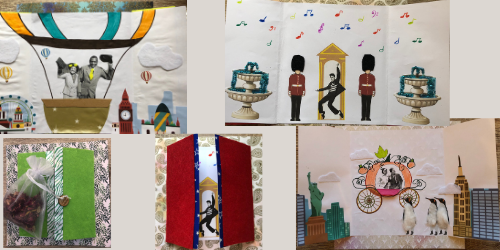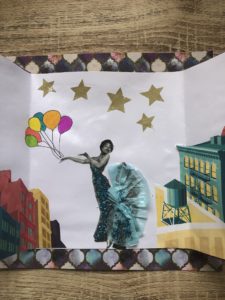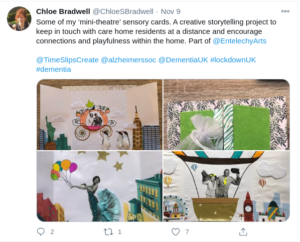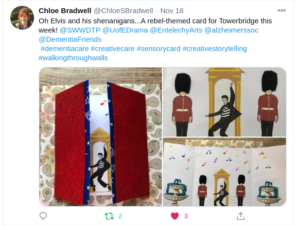
Creating ‘mini theatre’ sensory cards for care home residents living with dementia, by Chloe Bradwell.
Since March 2020, I have been working on a remote creative project which involves me making sensory cards for care home residents living with dementia. This project forms part of my PhD on the social and cultural value of performing arts with people living with dementia.
When the country first came into lockdown in March, I was in the middle of undertaking my field work in a dementia care home in London. The plan was, at the time, for me to observe creative sessions run by London-based participatory arts company Entelechy at Towerbridge care home. Entelechy artists collaborate with residents to uncover stories using words, music, poetry, theatre, tactile art and dance. In normal circumstances sessions, there is a reliance on improvised performances, as artists directly interact with people in the present moment, reacting to individuals’ flow and energy. Entelechy had just started to work on the project Trocadero Tales, that had the aim to bring the past alive in the present through music, memories and archives of the famous Elephant and Castle Trocadero cinema, dance and concert hall.
During the period of lockdown, the programme transformed into creative letter writing and film-making so that connections and collaborations between artists, residents and the wellbeing team could continue, even if the physical work was not possible anymore. The artists started to write personal letters to the residents with whom they had been working, playfully picking up conversations where they had left them. My role was initially to document everything created by the team to create an archive of the work.
After a few weeks, I started to become concerned that people with higher levels of dementia, who might not remember the artists or have been involved in the initial sessions, might be left out. I suggested to the Creative Director that I could start making sensory cards for people living with dementia who might not have engaged with the artists before. The idea was that these cards would serve as a prompt to create stories with the wellbeing and care staff. As the artists had been working on the theme of the Elephant and Castle’s Trocadero, I adapted these sensory cards so that they would fit within the general theme of the project run within the broader care home.
My cards feature historical celebrities that I position into imaginary situations. I write some open-ended questions for people to start creating stories without having to worry about what is right or wrong. The idea is to take away the pressure of remembering, to have fun and also to provide an easy creative tool for the care and activities staff to engage with people.

The cards are designed to be touched and felt, they are very sensorial and include various textures and smells, so that there is still a form of connection to the body and the senses (in line with the company’s work). To create an effect of surprise, each card has a pair of felt curtains for people to open, which is why I call them ‘mini theatres’. I often include props alongside the cards, such as photobooth accessories that I make to encourage playfulness.
The wellbeing manager of the home reported that the cards provide an opportunity to create small social events inside the care home. Residents and staff often gather over a cup of tea and answer the questions at the back, making up stories, having discussions, playing with the props, singing songs and more. And this is what is key for me – that this distance work manages to provide some real connections in between people inside the home.
I plan to keep on developing this project further and my next step is to hopefully start using these cards to link care homes residents through local school pupils through (distanced) creative storytelling.


Categorised in: Student Blogs